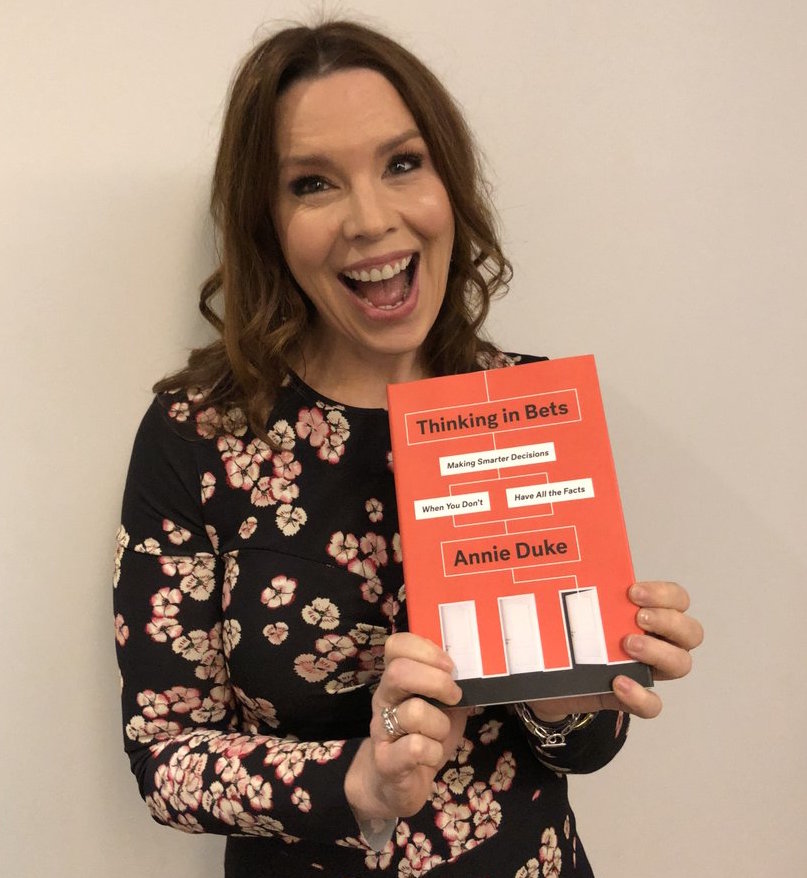
Mention the name “Annie Duke” and you’ll get a polarizing response from most of the poker community. To some, she is one of the top female players who ever came to the felt, winning over $4.2 million in tournament cashes on her way to a second career as a top-flight businesswoman with Ultimate Bet and as the commissioner of the Epic Poker League. To others, she is the epitome of an unscrupulous and unethical (let’s just say it rhymes with “witch”) who got out of the game ahead of the lynching party for her actions with those two businesses. Such a polarizing difference makes it difficult to dissect her latest book, Thinking in Bets – Making Smarter Decisions When You Don’t Have All the Facts.
Duke, who hasn’t had a significant live tournament cash since she won the 2010 NBC National Heads Up Poker Championship (for a $500,000 score), “retired” from the poker world (and its opinion of her) in 2012 (after the Epic Poker League went bankrupt) and, lacking a direction, fell back to the option that she once thought would be her life. Utilizing her education – she was a graduate student in psychology at the University of Pennsylvania – and her acumen on decision making from more than two decades in poker, Duke was able to reinvent herself as a “consultant on decision strategy” for the business world. Hence her new book, which she tries to emphasize “isn’t” a poker book.
Unfortunately, old habits die hard and Duke’s tome IS a poker book instead of the business strategy book she wanted. While she continually stresses that Thinking is not a book about poker, Duke continually comes back to the fact that poker and business ARE quite similar and, as such, she uses quite a bit of poker acumen (rather than business acumen) in explaining her stories. In fact, in an early anecdote she crosses the line between poker and business quite easily and unapologetically.
Duke’s story regarding a Chief Executive Officer and his decision regarding a company president is her first example of poker and business blending together. The CEO, after firing the president under discussion and the company entering a period of “hard times,” identified this move as one of the worst moves of his past year. Duke, however, instead identifies the CEO as being too focused on “resulting” – the eventual outcome of a move, no matter how correct it might have been – and states that it is a common occurrence in the game of poker.
In another segment where Duke attempts to use a gaming metaphor for a business decision, she mentions a prop bet made by Poker Hall of Famer John Hennigan that involved him moving to Des Moines, Iowa, for 30 days. After two days, Hennigan bought out of the bet, but Duke focuses more on the decision process that Hennigan and his fellow gamblers used to reach the proper wager and length of the bet to make it a tough decision for Hennigan – something that people in everyday life do when making decisions on relocating for a job, Duke surmises.
It seems that, while Duke is trying to put together a book that will be of assistance to business people – heck, maybe even the everyday person, especially when it comes to dealing with those who disagree with you – she also wants to relive her days when she was a feared player in the game. There is little that a businessperson would find in the book that would help them beyond what they already know, although they might find the gambling anecdotes amusing.
For those in the poker world that read the book, it might give them a moment of thought regarding how they think. I found that some of the information provided in the pages – the “resulting” segment was something that I see quite frequently on social media and poker forums, especially in strategy discussion of hands – would be useful to many people. Also of interest were Duke’s thoughts on qualifying statements (Duke believes that people don’t use the term “I’m not sure or positive” enough because it indicates indecision; she believes it indicates the ability to be able to formulate a new opinion) and how to work backwards from both a positive outcome and a negative outcome to be able to make decisions more effectively.
There are plenty of people who won’t give Thinking in Bets – Making Smarter Decisions When You Don’t Have All the Facts the time of day because Duke wrote the book. That’s unfortunate, because those people are missing out on what is actually an educational experience in learning how to use their brains more effectively. Just don’t be fooled into the statement from Duke that it isn’t a “poker book” – it’s just a book that applies equally to business as well as the game of poker, with A LOT of poker talk to emphasize her points.























